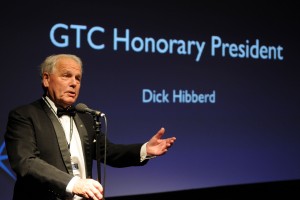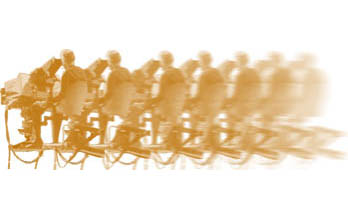 Dick Hibberd is Honorary President of the Guild of Television Cameramen. Here’s a short biog, written by him for the GTC website. I’m hoping that Dick will write up some more……
Dick Hibberd is Honorary President of the Guild of Television Cameramen. Here’s a short biog, written by him for the GTC website. I’m hoping that Dick will write up some more……
“I started my career in this industry as a trainee film director with a small company in Edinburgh, specialising in documentaries. After spells with both Ferranti and Decca Radar filming top secret flight trials, I moved to BBC Lime Grove as a Technical Operations Cameraman on Crew 1.
ATV beckoned with more money and I stayed there for 8 years doing multi-camera studio and OB work before moving on to Alpha TV in Birmingham, and then again to TWW in Cardiff. It was here that I began to see the necessity for an organisation to cater for the needs of television cameramen. From this realisation, with the help a few dedicated television cameramen friends, the Guild was born.
After TWW became HTV, I continued to work there as Head of Cameras for studio and OBs for 14 years.
My next and last move was to Thames TV to work as a technical supervisor, sometimes filling in as a lighting director, then studio supervisor, and finally as a production manager.
At the age of 80 I am still very active in the world of television. I now work (unpaid) as cameraman, lighting cameraman, director and tea boy gofer on amateur video productions. I am still fascinated by the media, with all its never-ending developments, and feel as strongly as ever about the need for a Guild of Television Cameramen, catering for both men and women the world over.”
Some of his memories of a long life in television….
I shall always be indebted to the BBC for the excellent training they gave me at Wood Norton, and like so many on my Tech Ops course I learnt to play table tennis quite well, and at 80 plus I still enjoy a game. I made very little use of the technical knowledge that I acquired at Evesham whilst I was operating cameras at Lime Grove and Shepherds Bush Empire, but it was put to good use when very many years later I become a Studio Supervisor at Thames TV (A sort of TOMs job), and I had to ask engineers to make technical arrangements for various productions.
Of course you will appreciate that I am of a somewhat earlier generation, and indeed sadly there are very few of my contemporaries still around, but it seems that some things changed very little at the Beeb for very many years. I left Aunty’s warm embrace shortly after the start of ITV, and followed in the footsteps of Colin Clews, Jock Watson, Tony Flanagan, Bill Ward, and quite a few others to join ATV. But that is another story.
Strange isn’t it, although I worked for 7 different companies during my TV career, I am often introduced by my friends to newcomers, as “This is Dick Hibberd, he used to be a BBC TV Cameraman” . I feel very proud when they say that.
………………………..
Bryan Cowgill had a reputation for being somewhat vitriolic on talkback. Fortunately I never experienced this first hand myself. I am reminded of the way that my first Senior Cameraman, BBCs Lime Grove Crew 1, Ted Langley, acted and responded to a similar totally unwarranted torrent of verbal abuse from a Director. When I first knew Ted, he was getting on, he had white hair, a white moustache, wore spectacles, one arm of which had been repaired with an Elastoplast. He had quite an intimidating presence, and we junior members of his crew were at pains to do as he bid us, and immediately. Ted also had some gravitas. On this occasion, he signalled to his tracker on the Mole Crane, to stop, lower and lock the arm. Ted dismounted from the camera, and without hurrying walked from the Studio floor. The Director was screaming and shouting nonstop, and could not grasp what was happening. Ted walked up the stairs into the Production gallery and stood behind the screaming Director. Ted tapped him on the shoulder, and asked quite mildly, “What exactly is it you want me to do?” The transformation of the Director was amazing. Suddenly he was all sweetness and light, and whilst a moment before, he had been talking to machinery, he was now talking to a human being, which was quite different. The Director explained, Ted went back to his camera, and a much calmer Director continued with the camera rehearsal.
That anecdote was true fact. I was there and I remember it well, but for me, as I grow older, I wonder if my memory plays tricks on me. I certainly worked on ‘Captain Pugwash’ at Lime Grove, ‘The Grove Family’, ‘In town Tonight’ with John Edisson. There were of course many, many more. It was on ‘What’s My Line’ with Barbara Kelly, Dame Isabel Barnett, Gilbert Harding, and David Nixon, that I had the first opportunity to operate a television camera ‘on air’. My number 1 cameraman was the diminutive Dicky Ashman. Dicky set up the shot, and I simply framed and focused, and panned between panelists, as directed. My heart was beating so fast, and I was probably sweating with excitement. If I did anything wrong, then millions of people would notice, this was ‘live’ television. Fortunately I didn’t, and they didn’t. I don’t think that it was ever so frightening again, but right to the end of my career, if I wasn’t slightly scared or worried before a recording, or transmission, then there was something wrong. Once you were ‘on air’ you were too busy to worry about what might go wrong.
Most of my time at the BBC Television Theatre, Shepherds Bush, was spent as a ‘tracker’ moving the camera and operator on a Vinten pathfinder, backwards and forwards along the centre ramp, to give the correct framing with a fixed focal length lens that the cameraman had selected. Apart from ‘What’s my Line’ there were other shows, such as the ‘George Mitchell Singers’, and a show that I didn’t enjoy, probably because I found Eamonn Andrews slightly twitchy manner acutely embarrassing – ‘This is Your Life’. When I left the BBC, I thought I had seen the last of TIYL, but no. Thames Television also ran the series, much later in my career.
I remember operating a camera which had a faulty viewfinder at the ‘Empire’. Both the line hold, and frame hold were free running, and you could only guess at your framing. A request for help from Vision Control went unanswered. This particular fault happened to me a number of times, and as a result I was having dreams in which the pictures that I saw in my mind would sometimes have line tearing, and frame rolls !
The BBC were extremely good at ‘training’ for which I have been for ever grateful. For newcomers to the Beeb, there was what was known as an ‘induction course’, where we were moved from department to department to enable to have some understanding of the operations of the whole television system. We were expected to ‘operate’ in each of these areas, under strict supervision. On one occasion when it was my term to spend a spell in master control, ‘The Goons’ were doing a show from the Shepherds Bush Empire, which concluded with Neddy Seagoon, and Bluebottle, having a duel with swords, across the footlights, and out of the front of the Theatre. We then had a shot from Master Control, where I was in Lime Grove, with the announcer, probably MacDonald Hobley, linking us into the next programme, a couple of minutes away. There was a crash as a door was slammed open and in came Harry Seacombe, and Peter Sellars, still fighting with their swords, from one side of the continuity set to the other, and disappeared from view. Mac Hobley totally ignored their presence, as was required, and that was the end of the excitement, and my introduction to the workings of master control. How they had managed to get so speedily from Shepherds Bush, along Goldhawk Road and up Lime Grove and up many stairs to Master control, I just don’t know. Of course nowadays, such a joke would be meaningless, as we all know we can pre-record anything, and there is no longer anything such as ‘real time’ but it was all ‘live’ then, and the viewer knew it, and I hope enjoyed it. I know I did.
I wonder now, did it really happen, or am I just imagining it……….!
I know what did happen, and that was the fact that every now and then, part of our crew was required to work from Alexandra Palace in north London. We would be bused up there to do the news. The cameras that we operated had laterally inverted pictures, and whilst ones natural tendency to compensate for a slight shoot off a caption to the right, would normally mean a slight pan left, you had to control your natural instincts and pan slightly right. It was a bit of nightmare to start off with, but you fairly quickly became accustomed to it. Sometimes it was a bit dodgy when you had lots of adjustments to make left and right, and you had to keep a firm control on not doing what came naturally!
Sadly for me, there is no official record of what programmes I worked on. The only record I have is in the few remaining diaries I have left, which recorded weekly where I was supposed to be working. So unlike our brothers in the film world, who are and always were, quite rightly, ‘credited’. Why this anomaly arose in the UK is difficult to fathom. All other crafts in television production received a credit but not cameras. A strange anomaly that still sometime happens today.



